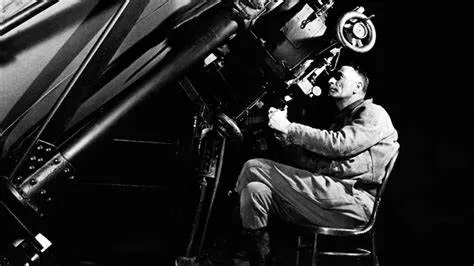
Edwin Hubble
Edwin Hubble was an American astronomer who is best known for his work on the expansion of the universe. His observations and discoveries have had a profound impact on our understanding of the cosmos and our place within it.
Hubble was born in 1889 in Missouri, and he received his undergraduate degree in mathematics and astronomy from the University of Chicago in 1910. He went on to earn a Ph.D. in astronomy from Yerkes Observatory at the University of Chicago in 1917.
In 1919, Hubble began working as an astronomer at the Mount Wilson Observatory in California. It was here that he made his most famous discovery: that the universe is expanding. Prior to this, it was thought that the universe was static and unchanging. However, Hubble’s observations of distant galaxies showed that they were all moving away from the Earth, and the farther away a galaxy was, the faster it was moving. This led to the conclusion that the universe is expanding, a concept that is now known as the Hubble expansion.
In addition to his work on the expansion of the universe, Hubble also made many other important contributions to the field of astronomy. He studied the properties of galaxies and discovered that there are many different types, including elliptical, spiral, and barred spiral galaxies. He also identified a relationship between the distance of a galaxy and its redshift, which is now known as the Hubble law. This relationship helps astronomers measure the distances to faraway galaxies and understand the expansion of the universe.
Hubble’s work has had a lasting impact on our understanding of the cosmos and has helped to shape the field of astronomy as we know it today. He received numerous awards and honors during his career, including the Presidential Medal of Freedom and the Congressional Gold Medal. He died in 1953, but his legacy lives on in the many discoveries and advancements that have been made in astronomy in the decades since.

astronomy
Edwin Hubble contribution to science
Edwin Hubble was a pioneering astronomer who made many significant contributions to the field of astronomy. He is best known for his discovery that the universe is expanding, which has had a profound impact on our understanding of the cosmos and our place within it.
Some of the key contributions that Hubble made to science include:
- The expansion of the universe: Hubble’s observations of distant galaxies showed that they were all moving away from the Earth, and the farther away a galaxy was, the faster it was moving. This led to the conclusion that the universe is expanding, a concept that is now known as the Hubble expansion.
- The classification of galaxies: Hubble studied the properties of galaxies and discovered that there are many different types, including elliptical, spiral, and barred spiral galaxies. He also developed a classification system for these different types of galaxies.
- The Hubble law: Hubble identified a relationship between the distance of a galaxy and its redshift, which is now known as the Hubble law. This relationship helps astronomers measure the distances to faraway galaxies and understand the expansion of the universe.
- The discovery of quasars: Hubble and his colleagues discovered the first quasars, which are extremely luminous and distant celestial objects that are believed to be powered by supermassive black holes.
- The measurement of the age of the universe: Using the Hubble expansion and other techniques, Hubble helped to estimate the age of the universe at around 13.8 billion years.
Overall, Edwin Hubble’s work has had a lasting impact on our understanding of the cosmos and has helped to shape the field of astronomy as we know it today.
